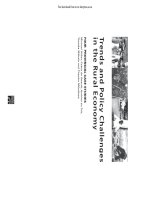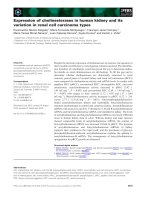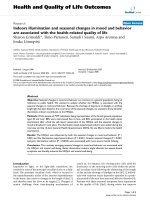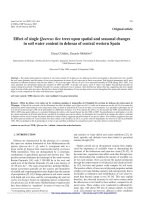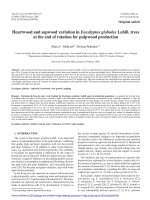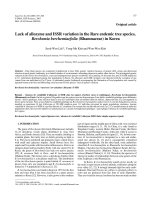Trends and seasonal variation in prices of soybean in major markets of Maharashtra state, India
Bạn đang xem bản rút gọn của tài liệu. Xem và tải ngay bản đầy đủ của tài liệu tại đây (140.71 KB, 4 trang )
Int.J.Curr.Microbiol.App.Sci (2020) 9(5): 2912-2915
International Journal of Current Microbiology and Applied Sciences
ISSN: 2319-7706 Volume 9 Number 5 (2020)
Journal homepage:
Original Research Article
/>
Trends and Seasonal Variation in Prices of Soybean in
Major Markets of Maharashtra State, India
S. S. Walke1*, Chowa Ram Sahu2, R. M. Takale1 and A. R. Kale1
1
College of Agricultural Allied Sciences, Sharadanagar, Baramati- 413102 (M.S), India
2
Department of Agricultural Statistics & Social Science (L.)
IGKV, Raipur-492012 (C.G), India
*Corresponding author
ABSTRACT
Keywords
Modal prices, Price
movements, Secular
trends, Seasonal
variation
Article Info
Accepted:
23 April 2020
Available Online:
10 May 2020
Soybean is the leading oilseed produced globally. It play significant role in
total oilseed production of India. Maharashtra is the second largest
producer of soybean after Madhya Pradesh in India. The present study
aimed to study price movement of soybean i.e. Secular trend and seasonal
variation, among the major soybean markets in Maharashtra. For study
purpose the data related to monthly modal prices of soybean were collected
from major markets from different markets in States viz. Latur, Khamgaon,
Nagpur and Higanghat for the period 2001-02 to 2019-20. There were an
increasing trend in the prices of selected soybean markets and was found to
be statistically significant at 1 per cent level of significance. The seasonal
indices of soybean prices were highest in the month of May and lowest in
the month of October during the period of study in the selected soybean
markets.
Introduction
Soybean (Glycine max L.) is known as
‘golden bean’ and grown all over world for
dual purpose that is oil seed as well as pulse
crop. The crop also has a prominent place as
the world's most important seed legume,
which contributes 25 per cent to the global
vegetable oil production, about two thirds of
the world's protein concentrate for livestock
feeding and is a valuable ingredient in
formulated feeds for poultry and fish. About
85 per cent of the world's soybean is
processed annually into soybean meal and oil.
The major soybean producing nations are the
United States, Brazil and Argentina. The three
countries dominate global production,
2912
Int.J.Curr.Microbiol.App.Sci (2020) 9(5): 2912-2915
accounting for 80 per cent of the world's
soybean supply. Global production of
soybean has grown at a CAGR of 4.1 per cent
from 282.749 million metric tons in 2013-14
to 346.919 million metric tons in 2017-18.
Production of soybean in India is dominated
by Madhya Pradesh and Maharashtra states
which contribute to 89 per cent of the total
soybean production in the country. Rajasthan,
Telangana, Karnataka, Chhattisgarh and
Gujarat states contribute the remaining 11 per
cent of production. Maharashtra state the
potential of becoming the leader in soybean.
It is a kharif crop, cultivated in month of June
to July and harvested by September to
November. There is a need to have a thorough
understanding of trends and seasonal variation
in the prices of soybean over time and space
as such an analysis is also useful to farmers in
order to decide the optimum time for
disposing off their produce to their best
advantage.
Materials and Methods
To study the price behavior in the selected
markets, the secondary data on monthly
modal prices Rs/q) of soybean were collected
from the website of Directorate of Marketing
& Inspection (DMI) ,Ministry of Agriculture
and Farmers Welfare, Government of India
( for the period of
16 years from 2001-02 to 2019-20 for Latur,
Khamgaon, Hinganghat and Nagpur markets.
Yt = a+ bx + e
Yt = Trend values at time ‘t’
x = Period
a = Intercept parameter
b = Slope parameter
e = Error
Annual trends of prices for the selected
markets were computed and compared. The
goodness of fit of trend line to the data was
tested by the coefficient of multiple
determination which is denoted by R2.
Estimation of seasonal indices of monthly
data
The seasonal pattern in prices of soybean was
analysed by constructing seasonal index
numbers. Seasonal index numbers are set of
numbers showing relative prices during
different months of a year, the year being 100
and total 1200. In the present study twelve
months moving average method was used to
measure the seasonal variation in prices, as it
is a fairly good estimate of the trend and
cyclical components combined.
The steps involved in the construction of
seasonal index by this method are:
Analysis of long-term movements (trend)
For estimating the long run trend of prices,
the method of least squares estimate was
employed. This method of ascertaining the
trend in a series of annual prices involves
estimating coefficient of intercept (a) and
slope (b) in the linear function form. The
equation adopted for this purpose was
specified as follows:
2913
(i) Generating a series of 12 months
moving totals.
(ii) Generating a series of 12 months
moving averages.
(iii)Generating a series of centered 12
months moving averages.
(iv) Expressing each original value as a
percentage
of
corresponding
centered moving average.
(v) Arranging the percentages of moving
averages in the form of monthly
arrays and calculating the average
index for each month.
(vi) Adjusting the averages to make their
sum equal to 1200.
Int.J.Curr.Microbiol.App.Sci (2020) 9(5): 2912-2915
This was done by working out the correction
factor and multiplying the average for the
month by correction factor, which was
estimated as follows:
1200
Correction factor =
4
Results and Discussion
Trends in prices of soybean selected
markets
The trends are the changes over years and are
associated with changes in technology of
production, input supply, infrastructure etc.
The study of trends enables us to indicate the
general direction of prices in different
markets. For estimating long-run movements
of soybean prices in the selected markets, the
data relating to prices of soybean were
subjected to linear trend analysis.
It is inferred from Table 1 that, the monthly
increase in prices of soybean was found to be
the highest in Latur market (Rs 14.49/qtl)
whereas it was the lowest in Higanghat
market (Rs 12.85/qtl). In all these markets,
the contribution of independent variable, time
to the change in prices was to the tune of 73
per cent to 77 per cent as indicated by R2.
There was not much variation in the extent of
increase in prices of soybean in the selected
markets. But Higanghat market registered the
lowest increasing trend compared to other
markets under study. However, the trend
analysis of prices indicated a positive trend in
all the markets.
Table.1 Trends in the prices of soybean in the selected markets
Markets
Latur
Khamgaon
Nagpur
Hinganghat
Equation
Y= 818.02**+14.492**t (0.60)
Y= 804.98**+13.448**t (0.58)
Y= 826.72**+13.445**t (0.52)
Y= 858.13**+12.85**t (0.49)
** Significant at 1% level
R2
0.74
0.73
0.77
0.77
Figures in parentheses are Standard Errors
Table.2 Seasonal indices of soybean prices in selected markets
Markets
Months
January
February
March
April
May
June
July
August
September
October
November
December
Total
Latur
Khamgaon
Nagpur
Hinganghat
97.71
98.93
100.87
105.99
109.99
104.77
104.17
103.94
99.69
84.89
93.81
95.25
1200
97.76
99.67
100.59
103.23
108.63
106.72
105.50
104.11
96.06
89.69
94.34
93.71
1200
97.33
98.41
101.59
105.17
108.46
104.47
105.26
105.63
95.62
88.44
95.23
94.39
1200
96.65
98.10
100.08
102.19
106.22
106.32
105.78
102.90
99.13
92.01
95.81
94.79
1200
2914
Int.J.Curr.Microbiol.App.Sci (2020) 9(5): 2912-2915
Seasonal indices of soybean prices in
selected markets
Seasonal fluctuations are the changes that
occur regularly every year during the same
period. The seasonal changes are caused
mainly by the seasonal nature of production
of the crop. The seasonal indices of price
would show the extent of fluctuations from
month to month and can be helpful in
indicating the right time for sale of produce.
It is inferred from Table 2 that in the Latur
market the highest seasonal index was found
in May, followed by April and June as the
indices stood at 109.99, 105.99 and 104.77
respectively. Lowest seasonal index was
recorded in October with 84.89. Kadam
(2016) also observed highest seasonal indices
of soybean price in June (108.99) and lowest
in the month of October (84.62) in Latur
market during the period from 2005-06 to
2014-15. In Khamgaon market highest
seasonal index was found in May, followed
by June and July as the indices stood at
108.46, 106.72 and 105.50 respectively.
Minimum seasonal index was recorded in
October with 89.69.
Nagpur market witnessed highest seasonal
index in May, followed by August and July as
the indices stood at 108.48, 105.63 and
105.26 respectively. Lowest seasonal index
was recorded in October with 88.44. In
Higanghat market highest seasonal index was
found in June, followed by May and July as
the indices stood at 106.32, 106.22 and
105.78 respectively. Lowest seasonal index
was recorded in October with 92.01. In all the
markets the seasonal indices were lowest in
the month of October.
The prices of soybean have been shown
continuous increasing trend during study
period. It is found that, there is seasonality
existing in prices of soybean within the year.
The seasonal indices were highest in the
month of May and lowest in the month of
October during the period of study. Such
research on prices of agricultural commodities
and market information is most important as it
helps the farmers in making wise decisions on
the crop to be grown, also prevent the farmers
exploitation by the middle men and guide the
farmers in selling, buying and storage of
produce.
References
Devendra Kumar Verma, Latika Sharma, Hari
Singh and Jitendra Suman. 2017 A
Study on Price Behaviour of Soybean in
Southern Rajasthan. Economic Affairs.
62 (3):531-535
Kadam, S.K. 2016. Behaviour of arrivals and
prices of soybean in Latur regulated
market in Maharashtra. International
Journal
of
Multifaceted
and
Multilingual Studies. 4(12): 1-4
Lakshmi Ramya, S.B., Devi Bhavani, I and
Prasad, S.V. 2018. Arrival pattern and
trends of chillies (Dry) in Guntur
market of Andhra Pradesh. Indian
Journal of Agricultural Marketing.
32(1): 63-69.
How to cite this article:
Walke, S. S., Chowa Ram Sahu, R. M. Takale and Kale, A. R. 2020. Trends and Seasonal
Variation in Prices of Soybean in Major Markets of Maharashtra State, India.
Int.J.Curr.Microbiol.App.Sci. 9(05): 2912-2915. doi: />
2915

